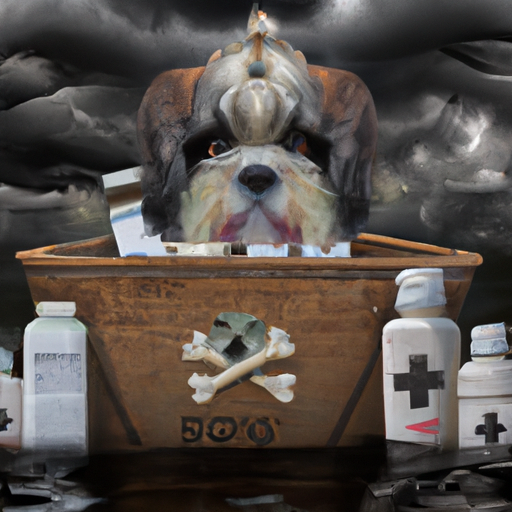As a caregiver, your pet’s health and safety are paramount to you. You’re probably familiar with the necessity of flea treatments in maintaining a dog’s overall wellbeing. However, it’s equally crucial to be aware that not all flea medicines are safe. Some can potentially harm, and even kill, your beloved canine companions. This article will delve into the details of what flea medicines are dangerous, why they’re harmful, the signs to look out for, safer alternatives, and how to protect your pets.
1. Dangerous Flea Medications
Flea medications are designed to eliminate pests, but some also pose dangers to pets. Particularly, certain ingredients in some flea treatments have been identified as harmful:
- Isoxazoline class of drugs (includes brands like NexGard, Bravecto, Simparica, and Credelio)
- Organophosphates (found in products like Hartz, Zodiac, and Sergeant’s)
These medications may be popular due to their effectiveness, but they come with a significant downside. They have been associated with severe side effects in dogs, including muscle tremors, ataxia, and seizures.
2. The Science Behind the Harm
Isoxazoline drugs work by disrupting the nervous system of fleas and ticks. However, in some dogs, these drugs can also interfere with the nervous system, leading to the aforementioned side effects.
Organophosphates, on the other hand, are a type of pesticide. They’re highly toxic and can cause a range of symptoms from vomiting to seizures, and in severe cases, death.
3. Signs of Adverse Reactions
Knowing the symptoms to watch for can help you act quickly if your pet is affected. Signs of adverse reactions to flea medication include:
- Vomiting or diarrhea
- Excessive salivation
- Fatigue or lethargy
- Muscle tremors or shaking
- Seizures
If your dog shows any of these signs after being treated with flea medication, contact your vet immediately.
4. Safer Alternatives
Thankfully, there are safer alternatives to these harmful flea medications. Consider the following:
- Topical Treatments: Products like Advantage II and Frontline Plus are applied to the skin and are generally considered safe.
- Oral Medications: Comfortis and Capstar are safer oral treatments, though they still have potential side effects.
- Natural Remedies: Some pet owners find success with natural treatments like essential oils, apple cider vinegar, and diatomaceous earth.
Remember to always consult with your vet before starting any new treatment.
5. Protecting Your Pet
Here are some steps you can take to protect your pet from harmful flea medications:
- Research: Before using any product, research it thoroughly. Look for any reports of adverse reactions.
- Consult a Vet: Always consult with your vet before giving your pet any new medication.
- Monitor Your Pet: Keep a close eye on your pet after administering medication. If you notice any adverse reactions, contact your vet immediately.
FAQ
Q: Are all flea medications harmful to dogs?
No, not all flea medications are harmful. Many are safe and effective when used as directed. It’s essential to research each product and consult with a vet.
Q: How long after using a flea medication will my dog show symptoms if affected?
Symptoms can occur within hours of application, but in some cases, it may take days. Always monitor your pet closely after administering medication.
Q: Are certain breeds more susceptible to adverse reactions?
Yes, some breeds may be more susceptible to side effects from certain medications. Always discuss this with your vet.
Q: Can I stop using flea treatments altogether?
Not using flea treatments can lead to an infestation, which can cause serious health issues for your pet. Always consult with your vet for the safest and most effective flea treatment options.
Q: What should I do if I believe a flea medication has harmed my dog?
Contact your vet immediately. If confirmed, you should also report the incident to the manufacturer and the U.S. Food and Drug Administration (FDA).
Remember, as a caregiver, your dog’s health is in your hands. Stay informed, vigilant, and proactive in protecting your furry friend from harmful flea medications.



